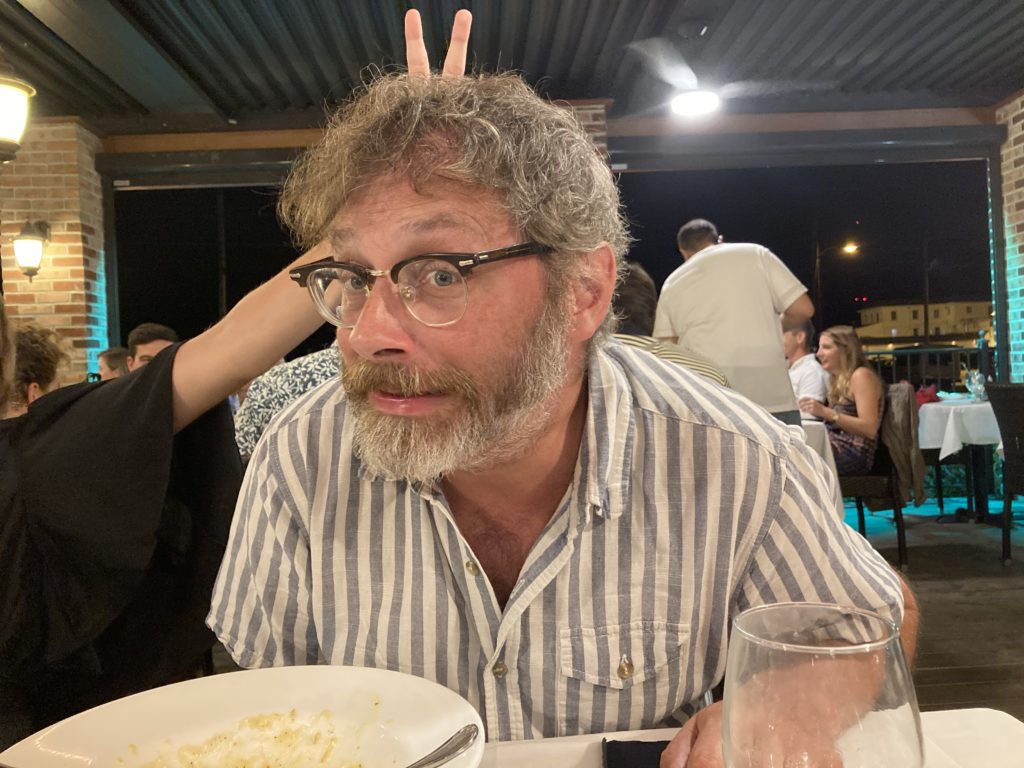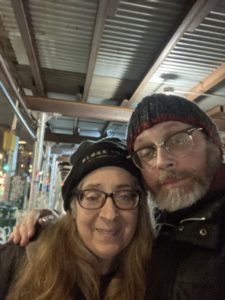Interview by Elinor Nauen
Why must the method for writing poetry differ from that of prose?
Poetry is not made of sentences, though the poet might decide to use sentences at any given point.
 Have you ever done any collaborations?
Have you ever done any collaborations?
I have collaborated with many humans and some animals, birds, fishies, and insects. Once I wrote every Saturday for many months with my friend D, a surrealist of his own making, but those pages are in the dot matrix crypt of noun grass. My brother and I have written some gnarly songs together. I collaborated on a song with the composer and musician David First. Sometimes I give titles to the painter Marley Freeman. Edwin Torres and I collaborated on an e-journal before such things existed. Jonathan Allen and I did a whole set of collaborations and he made some videos with me reading. Joanne Kotzke, dancer and choreographer, made a dance to an alphabet poem of mine, and we performed it with two other dancers at the Poetry Project’s New Year’s Marathon one Jan 1. LaTasha Diggs and I wrote a genius poem together called Bubble Metropolis for the Center of Book Arts. Many of my friendships with folks I met in the Bay Area feel like ongoing collaborations, whereas friendship in NYC has a different kind of character.
Did you ever like Gertrude Stein’s work?
I read Melanctha when I was in college in Buffalo and wondered what the hell she was doing. Every starting point with Stein is its own gorblimey. I read The Autobiography of Alice B Toklas next, and then maybe I read Wars I Have Seen. The poet George Albon told me reading The Making of Americans was like staring at the ocean for a long time—really boring and totally overwhelming, so that I didn’t feel the need to read it until I do. Tender Buttons I read, and I was asked to teach the Objects section to a whole bunch of freshman architecture students, who got what I was saying about hinge language and the indirect portrait. Composition as Explanation is maybe the piece of Stein’s I like the most, but I like all of these, like. I had a copy of Lifting Belly but a student I lent it to got mad at me and kept it.
What about jazz and bop as influences? How about the movies?
Bop as in bopped in the head was an early influence. Listening to [Thelonius] Monk and [Domenico] Scarlatti back-to-back-to-back-to-back was a specific influence 10 years ago, and therefore still. The movies influence my memory and my ability to not sleep. It’s hard to talk about things that provide so much pleasure—[John] Coltrane, Pharoah Sanders—as influences. I would like them to be, but then I also think influences, other people’s influences [upon me]—are part of the deal, and mysterious. Out and out imitation, too, is a crucial device. P. Sanders collaborations are inspiring.
How has Zen influenced your work?
By being important for Phil Whalen and Joanne Kyger.
What’s the difference between Jesus and Buddha?
I don’t care.
What about ritual and superstition? Do you have any about yourself when you get down to work?
I write by hand, on unlined paper, in artist sketchbooks of varying sizes. Wait a long time to type anything up. Still typing up my 2020 notebook. I type up what’s written without editing it, beyond spots where I can’t identify a letter in a word. I write outside. Sometimes I try to type onto a laptop, but it usually murders my vocabulary to do so and I resort to putting titles down such as “I Give A Shit” as a challenge to my educated compulsion towards literality, which I must resist, as I must also resist metaphor.
Can you say something of the genesis of a work before you sit down and begin—how much of it is set in your mind, for example?
Usually nothing much is set, but if I’m lucky a tone might be out in front of me to start with and move from. Sometimes the big or little page is enough of what’s set to start. When I’ve gotten into repeating forms or spaces or compulsory evidences I know they’re there for me until I or they are exhausted. All the Pregrets, Degrets, and Regrets poems were written out of wanting to make sound sculptures where things stuck to each other as a way to get further into consciousness moving as words.
How do you get along with other writers? Do you correspond with them?
I get along great with almost everybody, though I am shy and moody, though very funny when you let me listen to you. I like to ask and be asked questions.
What are the work-destroyers?
Speculation. Greed. Cops. Doctors. Bureaucracies. Think pieces. Phone calls. Mentorship. Interest. Ideas. Pets. Tofu. Hard Seltzer. Retweets. Galas. Admin. Meetings. Meetings about meetings. Intros.
What do you find the best time and place for writing
When the sun hits the sky like a big birdy pie.
Have you ever written any sonnets?
God, no.
Why is there a little white beard in your mortality belly?
I never learned how to take a proper shower.
Click to read Thomas Devaney’s review of Anselm Berrigan’s Pregrets in this issue of Boog City ANSELM BERRIGAN (https://www.wavepoetry.com/products/anselm-berrigan) has been contributing to Boog publications and reading at Boog events since the late nineties, and in 2000 was the baseball editor for issue eight of their litzine Booglit. A chapbook, Shoe, or Tree?, containing the whole poem for Lewis Warsh, is forthcoming from Boog City.
ANSELM BERRIGAN (https://www.wavepoetry.com/products/anselm-berrigan) has been contributing to Boog publications and reading at Boog events since the late nineties, and in 2000 was the baseball editor for issue eight of their litzine Booglit. A chapbook, Shoe, or Tree?, containing the whole poem for Lewis Warsh, is forthcoming from Boog City.
Berrigan is the author of many books of poetry: from Wave Books, Something for Everybody, Come In Alone, and Notes from Irrelevance; from Edge Books Primitive State, Some Notes on My Programming, Zero Star Hotel, and Integrity and Dramatic Life; and Free Cell from City Lights Books. He is also the editor of What is Poetry? (Just Kidding, I Know You Know): Interviews from the Poetry Project Newsletter (1983–2009) and co-author of two collaborative books: Loading, with visual artist Jonathan Allen (Brooklyn Arts Press), and Skasers, with poet John Coletti (Flowers & Cream). His chapbooks include Pregrets (Vagabond Press), and Sure Shot (Overpass Books). He is the poetry editor for The Brooklyn Rail, and co-editor, with Alice Notley and Edmund Berrigan, of The Collected Poems of Ted Berrigan and The Selected Poems of Ted Berrigan (both from University of California Press).
A member of the subpress publishing collective, he has published Selected Poems of Steve Carey and Hoa Nguyen’s Your Ancient See Through. From 2003-2007 he was artistic director of The Poetry Project at St. Mark’s Church, where he also hosted the Wednesday Night Reading Series for four years. He is co-chair, Writing at the Milton Avery Graduate School of the Arts interdisciplinary M.F.A. program, and also teaches part-time at Brooklyn College. He was awarded a 2015 Process Space Residency by the Lower Manhattan Cultural Council, and in 2014 he was awarded a Robert Rauschenberg Residency by the Robert Rauschenberg Foundation. He was a New York State Foundation for the Arts fellow in Poetry for 2007, and he has received three grants from the Fund for Poetry.
He lives in the East Village, where he also grew up.
ELINOR NAUEN (ElinorNauen.com), who once threw out the first pitch at a St. Paul Saints game, is an honorary lifetime member of the Baseball Hall of Fame.

